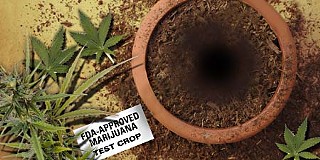Reefer Madness: Ill Will
DEA torpedoes work toward FDA-approved marijuana
By Jordan Smith, Fri., Jan. 23, 2009
Back in February 2007, medi-pot advocates were feeling optimistic that access to research-grade pot for use in Food and Drug Administration-approved studies might soon be opening up – and for good reason. That month, Administrative Law Judge Mary Ellen Bittner ruled in favor of allowing University of Massachusetts-Amherst professor Lyle Craker to begin growing a new crop of pot that would be available for research into the medicinal value of marijuana, with the ultimate goal of developing an FDA-approved medi-pot.
Craker initially applied to the Drug Enforcement Administration for permission to grow the test crop in 2001. After three years of bureauczratic delays, the agency concluded in 2004 that Craker's request should be denied. Craker, backed by the Multidisciplinary Association for Psychedelic Studies (a research outfit that aims to develop government-approved prescription drugs from controlled substances such as LSD, MDMA or Ecstasy, and pot), appealed that decision, which was heard by Bittner during nine days of testimony spread out over two months in 2005. A year and a half later, Bittner weighed in, agreeing that Craker should be granted permission to grow.
That pleased medi-pot advocates but wasn't the end of the story. Bittner's findings were nonbinding, so it would ultimately fall to DEA administrators to decide whether to accept her conclusions. On Jan. 7, Michele Leonhart, a DEA deputy administrator, finally weighed in on the matter, rejected Bittner's conclusions, and again denied Craker's application. Craker said the DEA decision was a "disappointment," but, "I don't think we need to be surprised" by it.

In a 118-page rejection letter, Leonhart concludes that Craker's bid to grow research pot is "precluded under Federal law," because, among other related reasons, he was unable to demonstrate to the agency that an additional source of research marijuana was actually needed to meet demand. (Read the DEA's rejection letter with this story below.) Indeed, since 1968, the University of Mississippi has held the only contract to grow pot for government-approved purposes – including providing pot for remaining participants of a federal medi-pot study group and for research approved by the National Institute on Drug Abuse (part of the National Institutes of Health), which actually doles out the dope to researchers. The arrangement means the dope is essentially under constant control of the feds, which is what is called for under the United Nations' Single Convention on Narcotic Drugs, to which the U.S. is a party.
Moreover, Leonhart writes in her opinion that no one much has complained about the quantity or quality of the Ole Miss dope and notes that as of 2005, the university had under its control some 1,055 kilograms (2,326 pounds) of the stuff in storage. In fact, she writes, there's so much in reserve that they haven't actually had to cultivate any new dope since 1997. "For the reasons indicated above, I have determined that [Craker's] proposed registration [to grow] is inconsistent with United States obligations under the Single Convention and with the public interest," Leonhart concluded.
While the DEA may not see a need to grow additional pot for research, Craker, head of the UMass Medicinal Plant Program; Multidisciplinary Association for Psychedelic Studies founder and President Rick Doblin; at least 47 members of Congress (including Massachusetts Sens. John Kerry and Ted Kennedy); and a broad swath of public health organizations – including the Lymphoma Foundation of America, the National Association for Public Health Policy, the Multiple Sclerosis Foundation, and the California Medical Association – disagree. Despite what the DEA thinks, the product provided by the University of Mississippi is inconsistent in quality, and the manner by which the government determines who will get pot for research is confounding. "We believe that marijuana should be treated like any other potential therapeutic medicine, with researchers having the ability to obtain it and test it, within federally-approved scientific research protocols," Dr. Jack Lewin, former CEO of the California Medical Association, wrote in a 2005 letter of support for Craker. "To date, it has generally not been treated that way, causing significant problems in the research into marijuana as a potential medicine. It is in the public interest to allow the scientific process to determine whether marijuana should be available as a medicine for sick patients who may need it, and DEA licensing of appropriate and qualified researchers is crucial to facilitate that process."
Craker finds the entire process frustrating. On one hand, the government remains skeptical about medical marijuana until solid research can prove otherwise, yet it continues putting up roadblocks to prevent progress on that front. "If there is no medical benefit [from marijuana], then it would be to [the government's] advantage to have it tested," Craker told the Chronicle.
Allen Hopper, the litigation director for the ACLU's Drug Law Reform Project, which is representing Craker, said the attorneys are still reviewing the DEA decision. Whether they will now appeal the decision directly to the U.S. appeals court for the District of Columbia circuit or will seek additional review within the DEA has not been decided. Hopper said that in her decision, Leonhart raises "evidence" never addressed in the hearings with Bittner, which may need to be addressed with the agency before moving the case to the federal court.
As frustrating as the entire experience has been, Craker vows not to give up: "The struggle is still in its beginning stages."
Download a PDF of the DEA's 118-page rejection letter to University of Massachusetts professor Lyle Craker
Got something to say on the subject? Send a letter to the editor.











